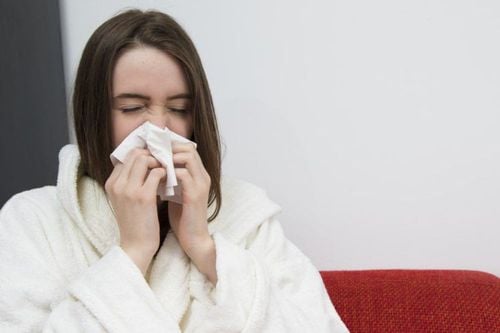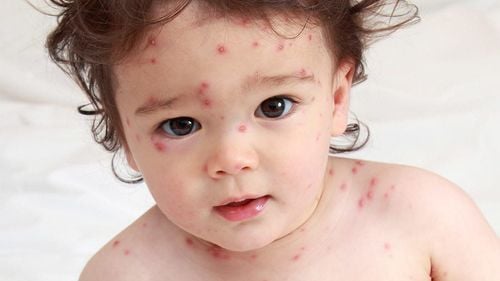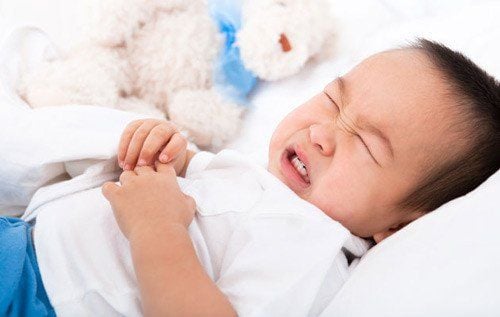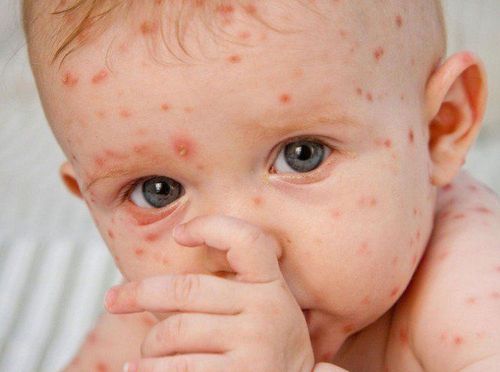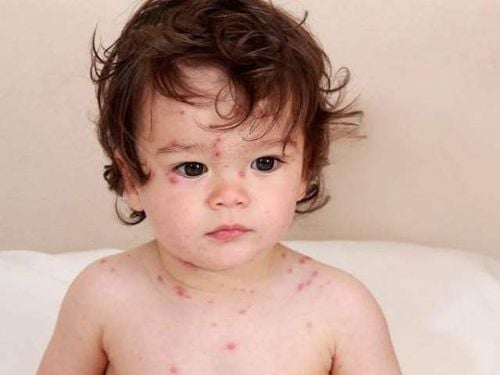This is an automatically translated article.
The article was professionally consulted by Specialist Doctor II Le Thanh Cam - Department of Pediatrics - Neonatology, Vinmec Da Nang International General Hospital.Chickenpox is a benign disease, with no severe symptoms except for the blisters, but it is easy to cause skin infections where the blisters grow, which can lead to sepsis, encephalitis.... Pregnant women have the disease. Chickenpox will be very dangerous for the fetus, can cause miscarriage or leave birth defects. Let's find out the causes and symptoms of the disease in the article below to have the right treatment and prevention.
1. What is chickenpox?
Chickenpox (also known as varicella) is an acute infectious disease caused by the varicella virus called Varicella virus. This virus is the causative agent of chickenpox in children and shingles in adults.This is a highly contagious disease that can occur in both children (more common) and adults. Spring is the time when chickenpox is at its strongest. The obvious manifestation of chickenpox is blistering blisters all over the body, even in the lining of the tongue and mouth.
The disease has many routes of infection, with many dangerous complications. Therefore, it is necessary to have basic knowledge about this disease in order to have timely prevention and treatment methods.
Trắc nghiệm: Bạn có phân biệt được chính xác cảm lạnh và cúm mùa?
Cảm cúm và cảm lạnh là hai khái niệm mà chúng ta thường đánh đồng nó giống nhau, không phân biệt rõ ràng. Dưới đây là một số câu hỏi trắc nghiệm, giúp bạn có thêm những kiến thức phân biệt cảm lạnh và cảm cúm. Từ đó, có những biện pháp điều trị bệnh phù hợp.2. Is chickenpox contagious?
Chickenpox is a contagious disease and is transmitted from person to person by direct contact, spread through the air from tiny droplets of saliva secreted from the respiratory tract (coughing, sneezing, talking) or spread from the fluid in the burn.In addition, chickenpox is also transmitted indirectly through objects contaminated with the fluid of the blister. Like sharing personal items: toothbrushes, towels, eating with someone who has chickenpox.
3. Symptoms of chickenpox through each stage
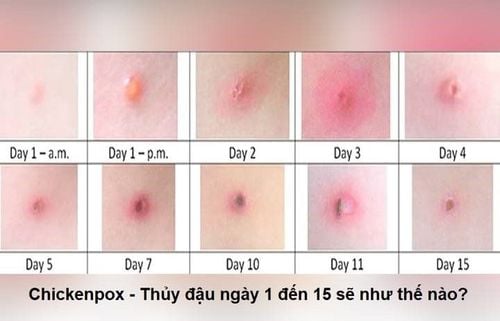
Chickenpox has 4 stages of development, each stage has different symptoms. Specifically:
3.1. The incubation period This is the period of viral infection, the period when the virus stays in the body and becomes sick. This phase lasts from 10 to 20 days. People infected at this time do not have any symptoms, it is difficult to recognize.
3.2. Stage of onset (disease onset) The time of onset of illness with symptoms such as mild fever, headache, and fatigue. A red rash a few millimeters in diameter begins to appear in the first 24 to 48 hours. Some patients also have lymph nodes behind the ear, accompanied by pharyngitis.
3.3. The full-blown phase The patient begins with high fever, loss of appetite, nausea, fatigue, headache, and muscle pain. The erythematous nodules begin to have circular blisters, 1 - 3 mm in diameter. The blisters cause itching and burning, which is very uncomfortable.
These vesicles appear all over the body, growing all over the patient's body. Grows into the oral mucosa causing difficulty in eating. In some cases, infected blisters will be larger in size, and the fluid inside the blisters will be cloudy due to the presence of pus.
3.4. Recovery phase After 7-10 days of illness, the blisters will burst, dry, and scab will gradually recover. During this stage, it is necessary to clean the chickenpox spots carefully to avoid infection. Combined use of scar medicine, dark medicine. Because chickenpox will leave pitted (concave) scars after they disappear.
4. Chickenpox and dangerous complications
Chickenpox is a benign disease, which will go away after a period of illness. However, any disease will have dangerous complications if not treated properly. Complications of chickenpox include:
Infection, causing sores after blisters burst, causing internal bleeding. This is a common complication in young children because they cannot abstain from using their hands to scratch an itch. Causes encephalitis, meningitis (appears after 1 week of blistering): is a complication that can occur in both children and adults, but adults are more susceptible to this complication. Accompanying symptoms include high fever, coma, convulsions, impaired consciousness, nystagmus. This complication can be fatal if not treated promptly. Chickenpox pneumonia: This complication usually occurs in adults, on the 3rd - 5th day after the onset of the disease. Manifestations include coughing a lot, coughing up blood, shortness of breath and chest tightness. Causes nephritis, acute glomerulonephritis: the symptoms of this complication are hematuria and renal failure.
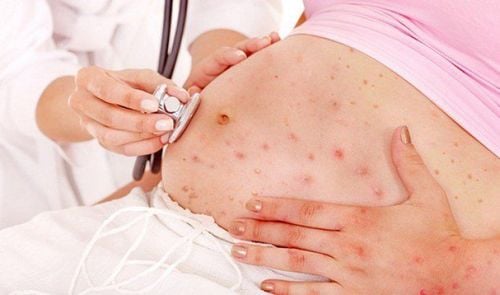
Pregnant women have chickenpox, if pregnant women get chickenpox 5 days before giving birth or 2 days after giving birth, they can transmit chickenpox from mother to baby, which can cause disability or death. Causes otitis media, laryngitis: because chickenpox blisters grow in this area, causing sores, infection, and swelling.
5. How to prevent and treat chickenpox
5.1. How to cure chickenpox There is currently no cure for chickenpox, only medications and supportive treatment methods. It is a benign disease, so it can be self-treated at home as prescribed by a doctor. Cases of complications require inpatient treatment at the hospital according to the doctor's schedule. For quick relief and safe treatment, it is important to note:
When treating at home:
Wear loose, soft and sweat-absorbent clothes to avoid breaking the blisters, avoid being out in the wind a lot. . Do not scratch the chickenpox blisters, to avoid spreading the disease more. Maintain body hygiene with antiseptic solutions, use warm water to wash gently, do not use cold water or water that is too hot. When there are signs of complications caused by chickenpox, it is necessary to immediately bring the patient to a reputable hospital for timely examination and treatment. It is necessary to actively isolate to avoid spreading the disease to others. When using drugs to treat:
With blisters on the body, you can use purple medicine to apply to the blisters to fight inflammation and prevent scars from forming. When the blisters are broken, methylene blue solution can be applied. Absolutely do not use Tetaxilin ointment and Penixilin ointment or red medicine. Absolutely do not use itch cream containing Phenol in children under 6 months old and pregnant women.
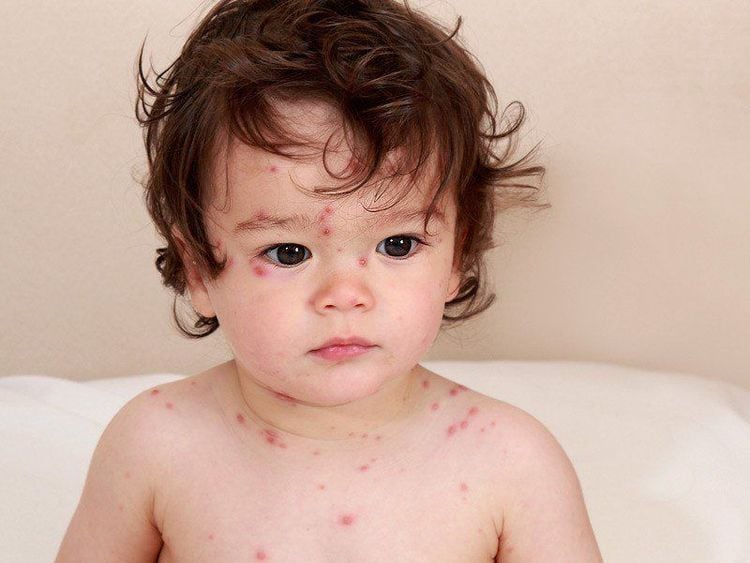
1st dose: When the child is over 1 year old. 2nd dose: Children from 1 to 13 years old: at least 3 months apart from the 1st dose. Children 13 years and older: At least 1 month apart from the first dose. When you come into contact with someone who has chickenpox and has not had the chickenpox vaccine yourself, you should get vaccinated within 3 days afterwards. Do not use personal items with an infected person, do not touch the chickenpox blisters. Patients need to be isolated from relatives as well as the community, to avoid spreading the infection.
Vinmec International General Hospital provides varicella vaccination services. If you need to inject individual vaccines, please contact Vinmec Hospitals or Clinics nationwide.
Please dial HOTLINE for more information or register for an appointment HERE. Download MyVinmec app to make appointments faster and to manage your bookings easily.
Importance of vaccinations on time
As recommended by medical experts, even during an epidemic, parents should still take their children to get vaccinated on schedule. Delaying the injection schedule can increase the risk of disease that has been ruled out or make infectious and superinfectious diseases such as influenza, measles, chickenpox, pharyngitis, pneumonia... become more severe and difficult to treat. than.
In the current epidemic situation, vaccination at the right time and on the right schedule is very important and necessary to promptly prevent the vaccinated disease and to not be confused with other diseases, not to cause worry for the family and friends. community. If a child has a cough or fever at this time, parents will be very alarmed as to whether this symptom is due to Covid-19 or another disease because some of the symptoms of Covid-19 infection are like flu or respiratory illnesses. other
Within the first 5 years of life, children can only build a complete immune system, so full vaccination is an effective way to strengthen children's resistance. Parents should note that when taking their children to get vaccinated, they should strictly follow the recommendations of the World Health Organization (WHO) and the Ministry of Health, such as wearing a mask properly, washing hands often with an antiseptic solution. In addition, parents are always updated with correct information about this strain of Covid -19 to protect themselves and their families from Corona Virus.
In areas where there is no epidemic, mothers can still have their children vaccinated according to the age-appropriate vaccination schedule, but avoid crowded places, make an appointment in advance to avoid waiting and go to the facility reliable medical facilities.
>> See more: Should vaccinations be delayed during the Covid-19 epidemic? expert advice by Specialist Doctor II Quach Nguyen Thu Thuy - Pediatric Center - Vinmec Times City International Hospital
Articles compiled from the source: Ministry of Health





